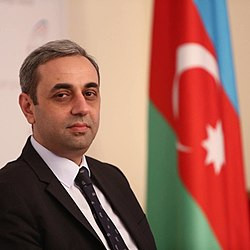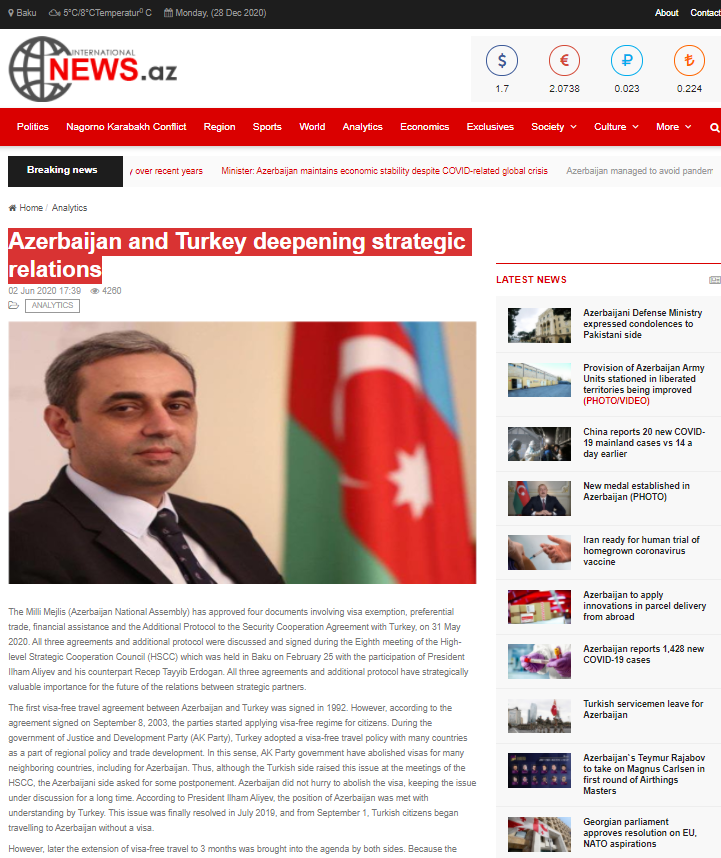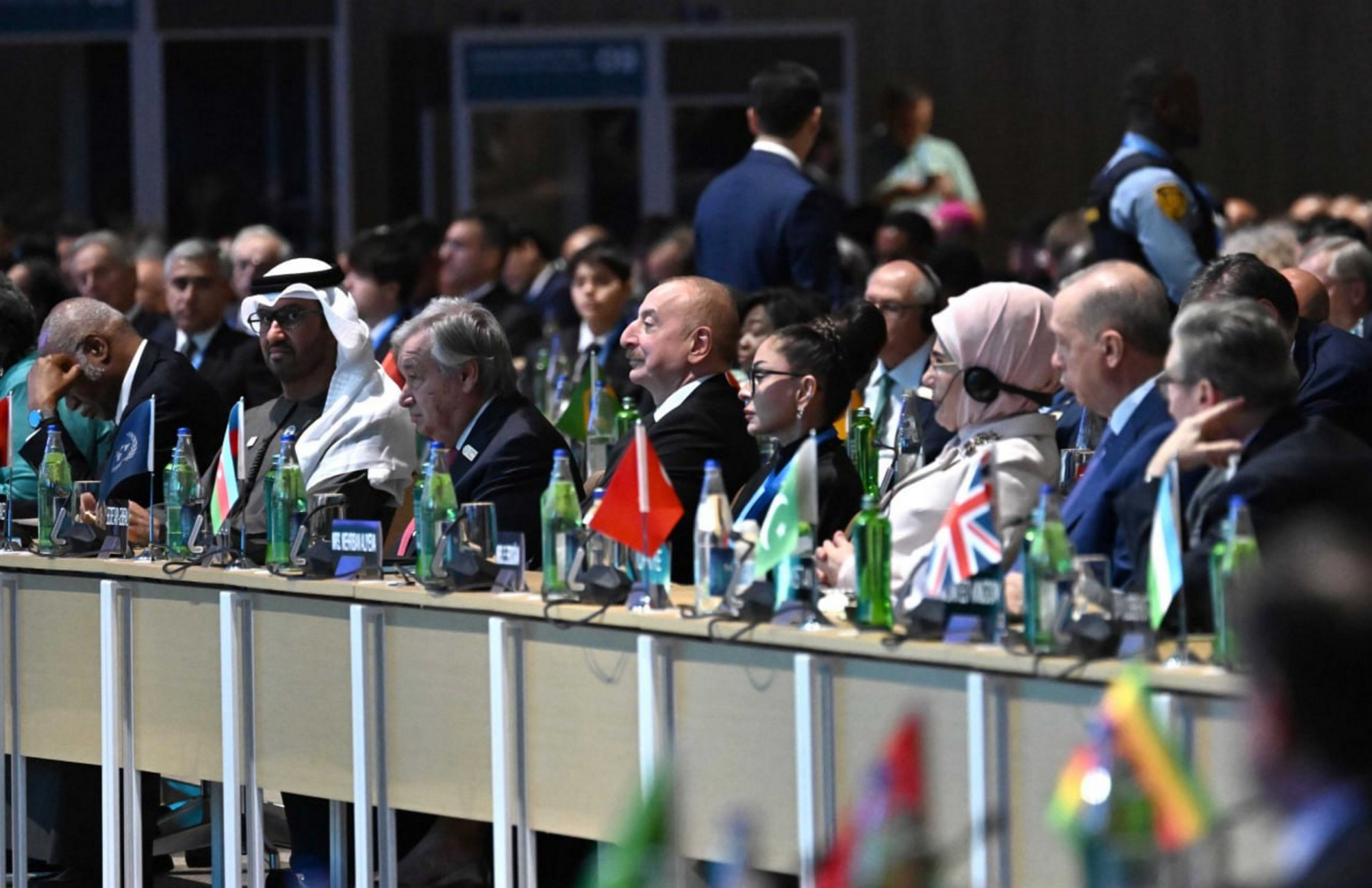The Milli Mejlis (Azerbaijan National Assembly) has approved four documents involving visa exemption, preferential trade, financial assistance and the Additional Protocol to the Security Cooperation Agreement with Turkey, on 31 May 2020. All three agreements and additional protocol were discussed and signed during the Eighth meeting of the High-level Strategic Cooperation Council (HSCC) which was held in Baku on February 25 with the participation of President Ilham Aliyev and his counterpart Recep Tayyib Erdogan. All three agreements and additional protocol have strategically valuable importance for the future of the relations between strategic partners.
The first visa-free travel agreement between Azerbaijan and Turkey was signed in 1992. However, according to the agreement signed on September 8, 2003, the parties started applying visa-free regime for citizens. During the government of Justice and Development Party (AK Party), Turkey adopted a visa-free travel policy with many countries as a part of regional policy and trade development. In this sense, AK Party government have abolished visas for many neighboring countries, including for Azerbaijan. Thus, although the Turkish side raised this issue at the meetings of the HSCC, the Azerbaijani side asked for some postponement. Azerbaijan did not hurry to abolish the visa, keeping the issue under discussion for a long time. According to President Ilham Aliyev, the position of Azerbaijan was met with understanding by Turkey. This issue was finally resolved in July 2019, and from September 1, Turkish citizens began travelling to Azerbaijan without a visa.
However, later the extension of visa-free travel to 3 months was brought into the agenda by both sides. Because the relations between the two countries in the field of education, trade, health were so developed that the one month visa-free regime was not fully workable as many citizens of both countries had to pay a penalty for violating time limit. As a result, a 3-month visa-free travel agreement was signed on 25 February during the Eight meeting of the HSCC held in Baku and approved by the Azerbaijani Parliament on 31 May. The agreement will come into force after the completion of internal procedures in both countries.
The second important agreement, which was adopted by the Milli Mejlis, is the preferential trade agreement between Azerbaijan and Turkey. According to the agreement, both parties will establish a joint committee to determine the list of goods to be included in the preferential trade agreement. According to Azerbaijan media, at the initial stage, 25 goods included to the list and the quota and tax for those goods will be lifted. In the next stage, the number of goods can be increased.
As both countries’ leaders mentioned it during the meeting in Baku on 25 February, the main goal of the preferential trade agreement is to increase trade between the two countries to 15 billion US dollars. For Azerbaijan, it will help to increase of the non-oil export to the Turkey. Turkey, as a brotherly country with 83 million population, is a huge market for Azerbaijan. It is possible that the parties will sign free trade agreement in the future, as the mutual relations will develop further. As a result, growing trade between the two countries will have a profoundly positive effect on mutual relations in many areas.
According to the Azerbaijani Customs Committee, in 2019 Turkey was the second largest trade partner of Azerbaijan after Italy. The trade volume between the two countries was 4 billion 509 million US dollars. Trade with Turkey accounts for 13.59 percent of Azerbaijan's foreign trade. In 2019, Azerbaijan exported 2 billion 863 million dollars worth of goods to Turkey and imported 1 billion 646-million-dollar worth of goods. Turkey is the second largest importer of Azerbaijan products after the Italy and the second largest exporter to Azerbaijan after the Russia. Turkey is also an important market for Azerbaijan's non-oil exports. Thus, Turkey ranks second in Azerbaijan's non-oil sector exports after Russia. However, Azerbaijan is in the last ranks in the overall foreign trade of Turkey.
The third important agreement which was adopted by the Milli Mejlis is the Military Financial Assistance Agreement and the Security Cooperation Agreement Additional Protocol. Financial assistance agreement and Security Cooperation Agreement Additional Protocol are complementing each other. In this sense, while the Financial Assistance agreement defines the amount of financial assistance to be allocated by the parties, the Military Cooperation Protocol specifies weapons and companies that will cooperate with Azerbaijan. According to media reports, Turkey will allocate about 29 million US dollars under this agreement to Azerbaijan.
The first military financial assistance agreement between Turkey and Azerbaijan was signed in 1999 and by the 2010 some other agreements were signed between two partners. The main purpose of those agreements was to implement NATO standards in Azerbaijani military forces and to support Azerbaijani servicemen operating under the Turkish command under the NATO umbrella in Kosovo. However, after Kosovo unilaterally declared independence in 2009, Azerbaijan withdrew its troops from Kosovo. In 2009, the acting coordinator role between Azerbaijan and NATO passed from Turkey to Romania. Since the 2010 cooperation in the field of defense industry included into the agreement. At present, Turkish-made weapons are growing in the arsenal of the Azerbaijani armed forces. According to the SIPRI 2020 report, in 2015-2019, Turkey ranked third arms exporter to Azerbaijan after Russia and Israel. Weapons imported by Azerbaijan from Turkey play an important role in ensuring the security of the Azerbaijan mainland and the security of Nakhichevan Autonomous Republic of Azerbaijan. Nowadays, the success of Turkey's armed drones in the conflict zones has attracted international attention. The current problem of the Turkish defense sector is the engine problem. If this problem is solved, arms relations between the two countries could develop to the level of heave weaponry such as tanks, helicopters and even aircrafts.
Generally, 2020 is an important year in terms of relations between the two strategic partners. Because it is the 10th anniversary of the signing of the Agreement on Strategic Cooperation and Mutual Assistance and the establishment of High-level Strategic Cooperation Council. Besides these agreements, the entry into force of visa exemption, preferential trade, financial assistance agreements and additional protocol could play important role in developing further strategic relations between the two countries.
https://www.news.az/news/azerbaijan-and-turkey-deepening-strategic-relations








